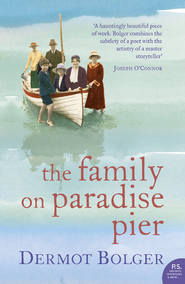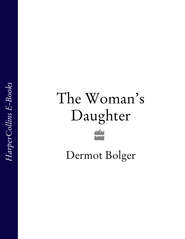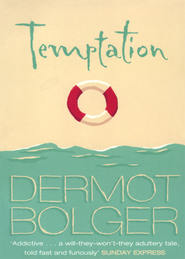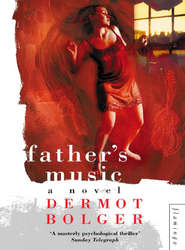По всем вопросам обращайтесь на: info@litportal.ru
(©) 2003-2024.
✖
The Valparaiso Voyage
Автор
Год написания книги
2018
Настройки чтения
Размер шрифта
Высота строк
Поля
‘Did you strike this boy?’ Mr Kenny asked me again.
Cormac looked up from where he knelt, trying to wipe blood from his nose. ‘No, he didn’t.’
‘I did so!’ I contradicted him, not knowing if I was trying to save Cormac or myself or us both. Clancy’s henchmen haunted every lane in Navan, whereas with Kenny it would simply be one beating. ‘He’s a little Brit,’ I said, parroting Clancy’s phrases. ‘They’re only scum over there in Scumland.’
‘Brendan didn’t touch me, sir,’ Cormac protested. ‘Please leave him alone.’
‘Stand up,’ Kenny told him. Cormac rose. I knew he was crazy, only making things worse. But Clancy and the others stepped back, suddenly anxious. Cormac’s honesty was illogical. There was no place for it in that schoolyard and they were suddenly scared of him as if confronted by somebody deformed or spastic.
‘You needn’t be afraid of what he’ll do to you at home. I’ll make sure your mother knows about this,’ Mr Kenny said, beckoning us to follow him.
A large wooden crucifix dominated the corridor outside the head brother’s office, framed by a proclamation of the Republic and a photo of a visiting bishop at confirmation time. I stood outside the office while Slick McGuirk and P. J. Egan pressed their faces against the window on their way home, muttering, ‘You’re dead, fecking dead!’
Their threats weren’t directed at Cormac sitting on a chair near the statue of Saint Martin de Pours, but at me. They ignored the child who had defied them, but, in acquiescing, I had become their new bait.
Phyllis didn’t even glance at me when she emerged from the head brother’s office. Her silence lasted all the way home as she gripped Cormac’s hand and I fell back, one step, two step, three steps behind them. Conscious of watching eyes and sniggers. Aware of hunger and of how my palms stung so badly that I could hardly unclench my knuckles after my caning by the head brother. Cormac didn’t speak either. Perhaps he realized that the truth was of no use or maybe he was exacting revenge for every sly pinch I’d ever given him.
The grass needed a final autumn cut in the back garden. I remember that leaves had blown in from the lane to cover the small lawn with a riot of colour. They looked like the sails of boats on a crowded river. I wanted nothing more than to block the real world out by kneeling to open my bruised hands and play with them.
‘Tháinig long ó Valparaiso, Scaoileadh téad a seol sa chuan…’
I remembered Brother Ambrose’s voice in class a few weeks before, losing its usual gruffness and becoming surprisingly soft as he seduced us with a poem in Irish about a local man who sees a ship from Valparaiso letting down its anchor in a Galway bay and longs in vain to leave his ordinary life behind by sailing away on it to the distant port it had come from.
Phyllis had left us alone in the garden. I knelt to gather up a crinkled fleet of russet and brown leaves and cast them adrift. Cormac watched behind me, then knelt to help by sorting out more leaves and pushing them into my hands.
‘What are they?’ he asked.
‘A fleet of ships. Sailing across the world to Valparaiso.’
‘Where’s that?’
‘Somewhere that’s not here.’
He nodded companionably as if the confrontation in the schoolyard had finally given us something in common. It was the first time we became absorbed in playing together, our hands sorting out the leaves excitedly.
‘The purple ones can be pirates,’ he suggested, ‘slaughtering the goody-goody ones that are brown.’
‘Did you come from Scotland on a ship?’
‘I don’t know.’
‘What was it like, Scotland?’
‘I don’t know.’
Footsteps made us turn. Phyllis was struggling with a spare mattress she had taken down from the attic, trying to force it out the kitchen door. Mutely we watched her haul it down the path. My blankets were already in the outhouse from last night. I have a memory of Cormac and I holding hands as we stood together. But this couldn’t be possible, because when she ordered me into the outhouse I was still clutching a pile of leaves tightly in both fists.
‘Put those down before you litter the place,’ she said. ‘Make a bed for yourself. I’ll not have a thug under the same roof as my son.’
Her make-up was streaked from tears. I didn’t want to simply drop the leaves. Cormac opened his hands and I passed them to him so that he could continue the game. He was still holding them, solemn-faced, when Phyllis slammed the door.
I don’t know at what hour my father came home, but it was long after the chorus of wood saws and the tic-tic-tic of upholstery tacks had died out in the garden sheds. He brought down a tray with water and a bowl of lukewarm stew. I told him the truth about Pete Clancy, crying my eyes out, desperate for someone to believe me. The terrible thing is that I think he did believe me, but just couldn’t afford to admit it to me or to himself.
Barney Clancy had dominated that outhouse on every occasion he stood there. His rich cigar smoke, the shiny braces, the shirts he was rumoured to have specially made in Paris. After years of hard times Clancy was putting Navan on the map. Without him there would be no Tara mines or queue-skipping for telephones or factories set up to keep the 1950s IRA men out of mischief. The new wing for Our Lady’s Hospital would not have been built, nor the Classical School resurrected from the slum of Saint Finian’s, and the promise of a municipal swimming pool would have remained just a promise.
Dynasties like the Fitzsimons, Wallaces and Hillards were among the decent honest politicians who would be easily elected for generations to come, but Barney Clancy was different from them and dangerous and special. People talked as if the River Blackwater would stop flowing into the Boyne below the town if he was not there like some Colossus to watch over us. Things were happening to Navan that the aborigines of Kells or Trim could only have wet dreams about. And my father played his part too, not just helping out with constituency matters but increasingly looking after domestic finance and bills and other mundane matters that Clancy no longer had time for. He was respected in the town as a lieutenant to the whirlwind whose audacity was making us the envy of Ireland.
‘I want no more trouble,’ my father said quietly when I finished crying. ‘If and when your mother forgives you you will come back in and stop behaving like a brat.’
He slipped me an old comic from his pocket as he left. It was crumpled and I’d read it a dozen times before. But I studied every word repeatedly to keep the darkness away. Dennis the Menace and the Bash Street Kids. I spoke their lines aloud, imagining myself at one with them for whole moments inside each story, caught up within their anarchic freedom. Then I’d reach the final page and sounds from the street intruded into my loneliness. Toilets flushing, canned laughter from television sets, a woman throwing tea leaves out the back door and banging the empty pot three times like a code.
After undressing I lay in the dark. I thought of Cormac’s white skin snuggled against mine as sleep overcame us on our ship with billowing sails of autumn leaves, which we had steered out along the Boyne to the open sea to sail towards Valparaiso.
Time is not a concept any child can properly understand. One night can last an eternity while several years fuse into a blur. Did my father and Phyllis decide on that first night to permanently exile me, or did my punishment simply become a habit, a decision they never got around to reversing? Maybe they rowed for months over it or perhaps my father simply let Phyllis get on with running the house. He was too swamped by internal County Council sniping with the main planning department and his recently acquired voluntary weekend role of trying to balance the household books of Barney Clancy so as to leave the great man free to focus on politics.
I once overheard my father tell Phyllis about Barney Clancy’s advice to a businessman moving to Athlone. ‘Make them sit up and quake in their boots at the sight of you. Look down your nose on every last Westmeath bog-warrior. Fear is the only way to get Athlone people to respect you.’ Respect. The word rankled with Phyllis, gnawing at her dreams like a cancer. She craved respect in the same way as women in Navan had started yearning to entertain at home with steak fondue evenings or to take foreign holidays that didn’t involve pilgrimages or fasting.
But the hardchaw Dublin workmen erecting a new fluorescent sign over O’Kelly’s butcher’s in Trimgate Street instinctively recognized one of their own as they wolfwhistled after her every morning, and other mothers at the school gate kept a clannish distance. Phyllis mimicked their accents, despising what she regarded as their bog fashions, headscarves and plump safely-married figures that were ‘beef to the heel like a herd of Meath heifers’. Yet she clung to any casual remark addressed to her, desperate for some sign of acceptance.
Back then neighbours counted how many tacks a man used to upholster an armchair, knew if the postman delivered a brown Jiffy bag from England or whose wife was spied visiting a chemist shop in an outlying town. It must have been obvious, even to Phyllis, that people knew and disapproved of my growing ostracism at home. Children from first marriages were sometimes treated as second-class citizens within Irish families, but never to this extreme. Furthermore, for all her airs, I was still a local and they regarded Phyllis as just a blow-in, tarting herself up like a woman on the chase for a husband instead of one securely married.
But the more they ignored her the more I bore the brunt of her frustration. Each day I came home from school, ate dinner at the same table as Cormac and was banished to the shed before she produced ice-cream for his dessert from the new refrigerator which gave itself up to convoluted multiple orgasms every few hours. When my father eventually arrived home he was sent down to harangue me over my latest alleged insult to his wife – Phyllis having abandoned the pretence of me calling her mother.
Some nights he lashed out at me with a fury that – even at the age of ten and eleven – I knew had little to do with my ‘offence’ or even the inconvenience of my existence. At such moments he became like a savage, needing to dominate me because I was the last thing he could control with life starting to spin beyond him. I’d seen him taunted on the street as ‘Clancy’s lap-dog in the Council’ and heard Pete Clancy’s joke about his father taking my father and Jimmy Mahon for a slap-up meal where he ordered steak and onions and when the waiter enquired, ‘What about the vegetables, sir?’ Clancy replied, ‘They can order for themselves.’
The only place where he still felt in command was the outhouse, in which he began to lock papers away in the filing cabinet again, warning me never to mention them to Phyllis. This made me suspect that they were related to my mother, photographs or other souvenirs of her unmentionable absence. Feeling that I was in the same room as them gave me a certain comfort at night.
Mostly, however, he didn’t hit me. After some half-hearted shouting he simply smoked in silence or questioned me about school, joking about the soft time pupils had now compared to his youth. ‘You’re happier down here with your bit of space,’ he observed once, more to himself than me. ‘Few boys your age have so much freedom.’
Often it felt like he was putting off his return back up to the rigid game of happy families being orchestrated in that house. Mama Bear, Dada Bear and room for only one Baby Bear. ‘She’s a good woman,’ he remarked after a long silence one night. ‘It’s not easy for her in this town.’ He looked at me as if wanting a reply, like he ached for reassurance or justification. Yet I knew he was so wound up that if I opened my mouth his fists would fly.
Some evenings I peered through the chicken wire to watch them play their roles in the sitting-room window. Except that nobody seemed to have told Cormac the plot. He had sole possession of the hearthrug and bedroom, but increasingly he wore the distant look I had first seen in the schoolyard. Self-absorbed, no longer clinging to his mother but largely ignoring them by escaping into his own inner world. He seemed the only one of us not to be bent and twisted like a divining rod by unseen tensions.
With the mines creating an influx of jobs, boom times were hitting Navan. Building sites sprang up. Anxious developers, farmers with land to sell and total strangers would call to the house at all hours, hoping in vain for a quiet word with my father after having no joy with the main planning department. Phyllis had instructions to run people like Slab McGuirk from the door, savouring her status at being able to exclude prominent citizens which made her feel as omnipotent as a doctor’s wife or priest’s housekeeper. Very occasionally she attended sod-turnings and ribbon-cuttings with my father if there was a slap-up meal later in the Ard Boyne Hotel or Conyngham Arms in Slane. A girl was paid to babysit Cormac on those occasions, while I was allowed up into the house, for the sake of appearances.
But the outings were rarely a success. The tension was so electric on their return that the babysitter was barely gone before the rows started. ‘What are you sulking about now?’ she would nag in a tipsy voice. ‘How I held my wineglass or laughed too loud or upstaged Clancy’s pig of a wife – the only woman in Navan who doesn’t know about his mistress in Dublin?’ Phyllis’s voice followed me, spoiling for a fight, as I was dispatched to the shed: ‘Come on! Tell me to start behaving like a grown woman. But you like me as a girl when it suits you, don’t you eh, Mr Respectable?’
I was eleven on the night when they grew so caught up in their row – which now seemed almost like a ritualized game leading to subsequent peace-offerings – that they forgot to properly close the bedroom curtains. The gap was small where they shifted in and out of the light. My father was naked, with black hair down his chest and his belly swelling slightly outwards. I didn’t know what an erection was, just that Phyllis knelt, wearing just a white bra, to cure it in the way that you sucked poison from a wasp sting. I should have been disturbed, but everything about the scene – the way they were framed by the slat of light, his stillness with his hands holding her hair and his face turned away – made it seem like a ceremony from some distant world that I would always be forced to witness from outside.
But I was outside everything now. The whole of Navan – and even the Nobber bogmen arriving in bangers with shiny suits crusted in dandruff – knew it. Pete Clancy perpetually devised new means of public ridicule. His fawning cronies brought in soiled straw to fling at me and shout that I had left my bedding behind. They held their noses when I passed, making chucking noises and perching like roosting hens on the bench in the concrete shelter.
The funny thing was that – although Navan would never accept a blow-in like Phyllis – Cormac had blended in, accepted and even slyly admired for his oddity. From the day that he contradicted Pete Clancy any bullying of him had switched to me instead, although I noticed that in the yard Slick rarely took his eyes off Cormac. He even made a few friends, boys who similarly seemed to inhabit their own imaginations out on the fringe of things. But for every friend Cormac made a dozen of mine melted away, aware that even association with me could put them at risk of being bullied too.
The town whispered about what was happening to me at home, with neighbours always on the verge of doing something. Teachers after I fell asleep in class, my mother’s only brother who arrived home from England and threatened to call to the barracks. A policeman spent twenty minutes in the front-room waiting to speak to my father, with not even Phyllis daring to send him packing. On another night a young priest came, very new to the parish, after spotting me at school. There was a brief and strained conversation before he left and never came back. Old Joey Kerwin probably called upon the curate with a bottle of whiskey and the advice that he would earn more respect in Navan for not stirring up unnecessary trouble and maybe leaving his guitar in the presbytery instead of flashing it around the altar.
Had my father been unemployed or a mere labourer I would have been taken away to be placed in the chronic brutality which passed for childcare. I would have shared a dormitory with forty other starving boys; been hired out as slave labour to local farmers; taught some rudimentary trade and lain awake, if lucky, listening as naked boys were flogged on the stone stairs while two Christian Brothers stood on their outstretched hands to prevent them moving. After the state subsidy for my upkeep dried up on my sixteenth birthday, the Brothers would have shown me the door, ordering me to fend for myself and keep my mouth shut.
When boys disappeared into those schools they never reappeared as the same people. Something died inside them, caused by more than just beatings and starvation. But that system was designed to keep the lower orders in check and provide the Christian Brothers with an income. For the son of a senior County Council official to be sent to an industrial school was as unthinkable as for a priest to bugger a Loreto convent girl. The middle classes managed our own affairs, with minor convictions squashed by quiet words in politicians’ ears and noses kept out of other people’s business. No action was ever taken about my confinement, my occasional bruises or burst lip, or the fact that neighbours must have sometimes heard me crying. My father just got busier at work and – corralled in the home – Phyllis grew ever more paranoid about ‘the interfering bitches of the town’.










